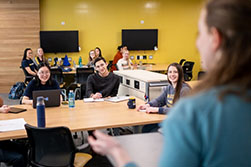Are you looking for effective ways to integrate writing instruction into your courses? Curious about assigning blogging, for instance, but uncertain where to begin? Looking for ways to make the most out of student peer reviews, or individual reflective writing assignments? Hoping to use writing to foster student learning in a discipline where they might not expect it? In this guest blog, Shelley Manis, a faculty member at U-M's Gayle Morris Sweetland Center for Writing, highlights new online resources that can help you achieve any and all of those goals.
 Using Blogs in the Classroom
Using Blogs in the Classroom- Motivating Students to Read and Write in all Disciplines
- Cultivating Reflection to Help Students Become Self-Directed Learners
- students need explicit training in metacognition and reflection (for which we provide strategies)
- effective reflection is problem-based
- reflection should happen at three distinct stages of the writing process: planning, monitoring (in-process), and evaluating.

Shelley Manis
Sweetland Center for Writing
- Log in to post comments
- 86 views






